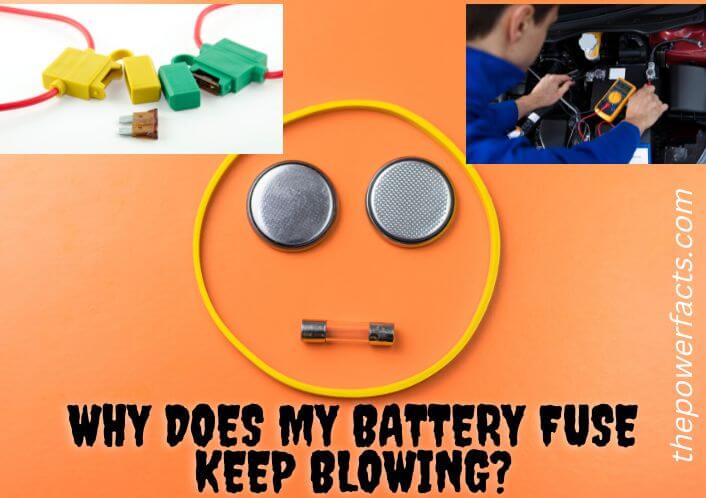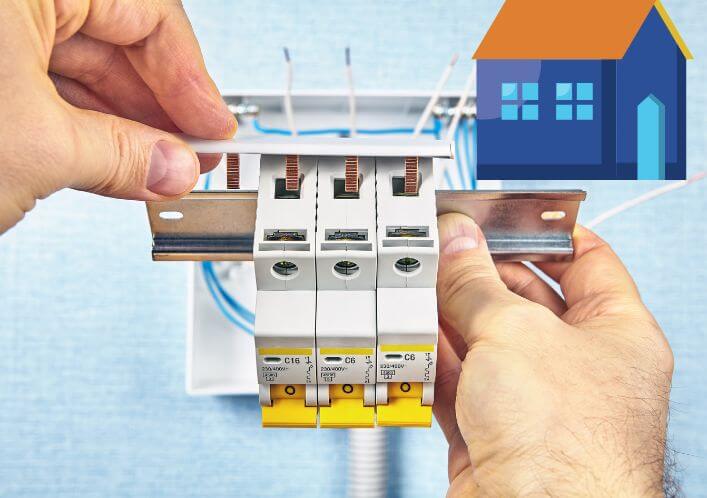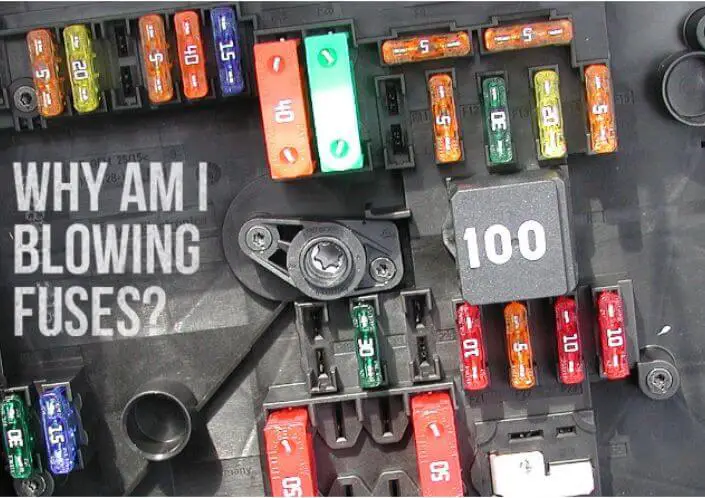Batteries are a common source of electrical problems in cars. The battery supplies power to the starter motor, ignition system, and all of the lights and accessories in your car. If any of these systems are not working properly, it can cause the battery to overheat and blow a fuse.

If you’ve ever had a battery fuse keep blowing, you know how frustrating it can be. Here’s a look at why this happens and what you can do about it.
There are a few reasons why your battery fuse might keep blowing.
One possibility is that there’s a short circuit somewhere in your electrical system. This can happen if your wires are damaged or if you have a loose connection somewhere.
Another possibility is that your battery is simply overloaded.
This can happen if you’re constantly using high-powered electronics like stereos or TVs. If your battery is too small for the load, it could cause the fuse to blow.
So what can you do about it?
If you think there may be a short circuit, have your electrical system checked by a professional.
Why Does Fuse Keep Blowing in Car?
If your car’s fuse keeps blowing, it’s important to figure out why. Otherwise, you’ll just be replacing fuses over and over again. There are a few possible reasons for a fuse to keep blowing in a car.
One possibility is that there is a short circuit somewhere in the electrical system. This could be caused by a wire that has come loose and is touching something it shouldn’t be, or by a faulty component like a switch or relay. If there is a short circuit, the current flowing through the system will be too high and will cause the fuse to blow.
Another possibility is that there is an overload on the system. This could be caused by too many accessories being plugged into the cigarette lighter or by using high-powered items like heated seats or an aftermarket stereo system. If there is an overload, the fuse will blow to protect the electrical components from damage.
Finally, it’s also possible that the fuse itself is faulty and needs to be replaced. If you’ve ruled out all of the other potential causes, this may be the problem. Fuses can sometimes go bad even if they’ve never been used before, so it’s always worth checking if your car’s fuse keeps blowing.
What Would Cause a Fuse to Keep Blowing?
A fuse is designed to protect an electrical circuit from excessive current. It does this by “blowing” or melting when too much current flows through it. There are several things that can cause a fuse to keep blowing:
1. A short circuit in the circuit that the fuse is protecting. This can be caused by a wire that has come loose and is touching another wire, or by a component that has failed and is drawing too much current.
2. A problem with the wiring itself, such as a loose connection or a break in the insulation.
3. An overloaded circuit. This happens when you try to draw more current than the fuse is rated for, such as by plugging in too many appliances or using one that draws more power than the others on the same circuit.
4. A sudden surge of power, such as from a lightning strike nearby or from switching on a large appliance like an air conditioner.
How to Fix a Fuse That Keeps Blowing?
If your fuse keeps blowing, it’s important to figure out why. Otherwise, you’ll just be replacing fuses all the time. Here are some tips on how to fix a fuse that keeps blowing:
| Check for loose wires | Loose wires can cause a short circuit, which will cause the fuse to blow. Make sure all of the wirings in your electrical panel are tight and secure. |
| Check for overloaded circuits | If you have too many devices plugged into one circuit, it can overload the circuit and cause the fuse to blow. Try unplugging some of your devices and see if that solves the problem. |
| Check for faulty devices | If you have any devices that are drawing too much power, they could be causing the fuse to blow. Try unplugging these devices and see if that solves the problem. |
| Replace the fuse with a higher-rated one | If you keep blowing fuses, it might be because you’re using too much power on that circuit. Replacing the fuse with a higher-rated one will allow more power to flow through without blowing. |
Fuse Blown
A fuse is a device that helps protect electrical circuits from overloads by interrupting the flow of electricity if too much current passes through it. If a circuit has too much current flowing through it, this can cause damage to the wires and other components in the circuit. A blown fuse indicates that there is an overloaded circuit that needs to be repaired.
If you have a blown fuse in your home, it’s important to take action quickly to repair the problem. Depending on where the fuse is located, you may be able to replace it yourself. However, if you’re not sure how to safely replace a fuse, or if the problem is more serious than a blown fuse, it’s always best to call an electrician for help.
Main Fuse Blown in House

If you have ever blown a fuse in your home, you know it can be a frustrating experience. Not only do you have to find the right replacement fuse, but you also have to figure out what caused the fuse to blow in the first place. If the main fuse in your home has blown, it is possible that there is a more serious problem with your electrical system.
The main fuse in your home is responsible for providing power to all of the circuits in your house. When this fuse blows, it means that there is an overload of electricity somewhere in your electrical system. This could be caused by a number of things, including faulty wiring or too many appliances plugged into one circuit.
If you find yourself with a blown main fuse, the first thing you should do is call an electrician. They will be able to determine what caused the overload and make any necessary repairs. In some cases, simply replacing the blown fuse will solve the problem.
However, if there is more damage to your electrical system, it may be necessary to replace some of your wirings.
Fuse Keeps Blowing in Car Cigarette Lighter
If your car’s fuse keeps blowing in the cigarette lighter, it’s important to figure out why. Otherwise, you’ll be constantly replacing fuses and won’t be able to use your cigarette lighter. There are a few reasons why this might happen.
First: There could be a short circuit in the wiring leading to the cigarette lighter. This can happen if the insulation on the wires is damaged or if the wires themselves are touching each other.
Second: Another possibility is that there’s something wrong with the cigarette lighter itself. It could be defective or have a loose connection.
Finally: It’s also possible that there’s an issue with the electrical system in your car. If this is the case, it’s best to take it to a mechanic and have them take a look at it.
They’ll be able to diagnose and fix the problem more easily than you would be able to on your own.
15 Amp Car Fuse Keeps Blowing
If you’re having trouble with your car’s fuse constantly blowing, it could be due to a number of different reasons. Here are some things to check if you’re trying to figure out why your 15 amp car fuse keeps blowing:
- Check for any loose wires or connections. If there are any exposed wires or faulty connections, this could be causing your fuse to blow. Make sure all connections are tight and secure.
- Inspect the area around the fuse for any signs of heat damage. If there is excessive heat damage, it could be causing the metal in the fuse to expand and contract, which would eventually lead to the fuse blowing.
- Check your car’s wiring diagram to see if there are any other electrical components that are connected in series with the circuit that includes the 15 amp fuse. If there are, make sure those components are working properly as well.
Blown Fuse in Car Symptoms
If your car’s fuse blows, it can be a symptom of a larger problem. Here are some common symptoms of a blown fuse in a car:
1. The car won’t start. This is the most common symptom of a blown fuse. If your car’s fuse has blown, it means that there is an electrical issue somewhere in the car that is causing the current to overload.
2. The headlights are dim or flickering. If your headlights are dimming or flickering, it could be a sign that the fuse for your headlights has blown.
3. The radio stops working. Another common symptom of a blown fuse is if your car’s radio suddenly stops working. Leaving your car radio on for an extended period of time will eventually drain the battery.
This could be due to a number of issues, but if you notice that this happens after replacing your battery, it’s likely that the new battery caused an electrical surge that blew the fuse for your radio.
4. The windows stop working. If your power windows suddenly stop working, it could be another symptom of a blown fuse.

FAQs
What Does It Mean If a Fuse Keeps Blowing?
If a fuse keeps blowing, it means that there is an electrical problem somewhere in the circuit. This could be caused by a short circuit, loose wiring, or a faulty appliance. If you keep having to replace the fuse, it’s important to find the root cause of the problem so that you can fix it and prevent further damage.
What Happens If the Battery Fuse Blows?
A battery fuse is designed to protect your car’s electrical system from overloading. If the fuse blows, it means that there is an excessive current flowing through the circuit. This can be caused by a number of things, such as a short circuit, loose wiring, or a faulty component.
If your battery fuse blows, it’s important to find out what caused it. Otherwise, you run the risk of damaging your electrical system or causing a fire. Once you’ve determined the cause, you can replace the fuse and fix the problem.
How Do You Stop a Fuse from Blowing?
If you’re noticing that your fuses are blowing more frequently than usual, there are a few things you can check to try and determine the cause. Different battery sizes are needed for different devices. First, make sure that you’re using the correct size and type of fuse for your circuit. If the fuse is too small or not rated for the current flowing through it, it will blow more easily.
Second, check for any loose connections in your wiring. If a wire is loose or frayed, it can cause a short circuit that will trip the fuse. Finally, if you have any devices on the circuit that are drawing more power than usual (like a space heater), they may be causing the fuse to blow.
If you’ve checked all of these things and you’re still having problems with blown fuses, you may need to consult an electrician to determine if there is a more serious problem with your electrical system.
Conclusion
If your battery fuse keeps blowing, it could be because of a few different reasons. The most common reason is that the battery is old and needs to be replaced. Another possibility is that there is something wrong with the electrical system in your car.
If you keep having this problem, you should take your car to a mechanic to have it checked out.